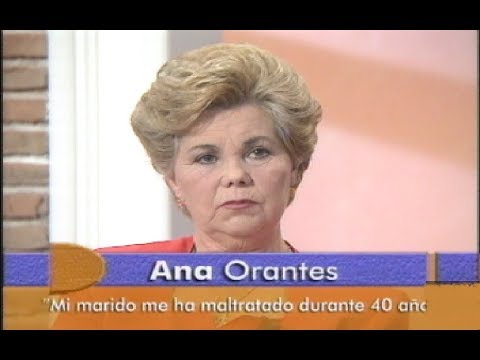Ana Orantes (Spanish) never got the chance to live her life as free as she wanted, but her death sparked an outcry that changed the laws of Spain.
Ana’s husband began beating her while they were still newlyweds. The first time he hit her, she didn’t know why. She apologized. He spit in her face.
For forty years, she endure this torture in her home in Andalusia. According to the New York Times, he would beat her regularly, “sometimes grabbing her by the hair and smashing her against a wall. After work, he would go to a bar with friends to play cards, then come home drunk and hit her for random reasons, complaining that she had moved a chair or had placed a glass upside down.”
If she opened a window and a man looked at her, her husband would confront her and accuse her of cheating. If she danced with her cousin, she was questioned and hit again.
Ana felt trapped. Due to societal norms at the time, no one believed a woman when she said she was abused. There were no laws protecting women from domestic violence. It wasn’t considered “a real problem,” because many people believed the woman probably deserved to be hit.
Her husband also abused his children. Ana once recounted a story about how he had touched one of her daughters inappropriately on her thighs under the table during dinner. Ana confronted her husband. He accused his daughter of making up the story. He hit Ana and warned her to not file a complaint with the police. Scared, her daughter never told Ana anything else. Her sons have also claimed to have been abused by their father.
Ana never stop trying to end the abuse. Later in her marriage, she regularly reported what was happening to the police. They didn’t care. She was told these kinds of fights are normal in a family. She reported her husband fifteen times to the police. Fifteen times she was ignored.
Divorce in Spain wasn’t legal until 1981. Ana tried for many years to obtain a divorce. It was granted in 1996, but the judge said she and her now ex-husband must share the same house. She lived upstairs. He lived downstairs. Although her ex-husband now lived with another woman, Ana reported there were still fights and more abuse.
On Dec. 4, 1997, she went on the television show, “De Tarde en Tarde.” It was here the public learned of the physical, emotional, and sexual violence she had endured for forty years.
Ana was forbidden to see her family. She was forbidden to attend the weddings of her siblings. She had to secretly visit her mother.
She was beaten near-death several times. She was kicked in the stomach. Her husband sat her in a chair and hit her with a stick until she was forced to say he was right. On the show, she reported she couldn’t breathe and she couldn’t talk. Her husband told her over and over she didn’t know how to talk and that she was illiterate.
Ana spoke about how she felt she was dumb – she never attended school – she was just furniture, and that she was worthless.
“I had to endure it, I had to endure beating after beating. I feared him. I was terrified of him. If it was 10 in the night, and he wasn’t home yet, I started trembling like a little girl, because I knew what was coming…”
Ana’s heartbreaking story was a lot for the Spanish public to take in, but they listened. On Dec. 17, 1997, thirteen days after her television interview, her husband returned to the house to kill her.
After waiting for Ana to arrive, he grabbed her from behind. He beat her, tied her to a chair, threw her over a balcony, poured gasoline on her, and burned her alive.
The people of Spain were outraged. Rallies were held across the country calling for the protection of domestic violence victims. The conservative government at the time dismissed the rallies and dismissed Ana as an “isolated case.”
Groups began keeping statistics to prove the prevalence of domestic violence. In 2004, Prime Minister José Luis Rodriguez Zapatero introduced the first laws addressing domestic violence. Restriction orders came into being. Centers to help abused women were created and psychological abuse was recognized as a crime.
Since then, the far-right Vox party has pushed for their elimination. The people continue to fight in the name of Ana and all those who were subjected to domestic violence.
Ana’s ex-husband turned himself into the police. He was sentenced to seventeen years in prison. He died seven years later, behind bars, of a heart attack.
Ana Orantes, a sixty year old mother of eight, had the courage to speak up even though she knew it might end in her death. She hoped her story would let other victims of domestic abuse know they were not alone.
If you speak Spanish, you can learn more about Ana Orantes in a four-part podcast by Newtral Journalist Noemí López Trujillo.



Jina Red Nest
Many women suffer its sad but here is an example of fighting back